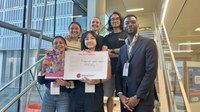Idiap researchers are Lemanic Life Science Hackathon winners
Tilak, an Idiap research assistant enrolled as a PhD student at EPFL, and Barbara, a research intern at Idiap, are working on the EMIL project, funded by the Swiss National Science Foundation (SNSF) and Innosuisse, and led by Dr Mathew Magimai. This research project aims to use AI to support individuals afflicted with Parkinson's disease.
The EMIL project aims to develop and evaluate the feasibility of a new closed-loop Deep Brain Stimulation control system. This system seeks to minimize motor and non-motor symptoms of Parkinson's disease, thereby maximizing patients' quality of life. To achieve this, one of the essential parameters is automatically detecting the patient's emotional and mental state through vocal biomarkers, explained Barbara and Tilak.
To develop their prototype, Barbara and Tilak worked on a user interface. The idea is that, via a platform, a person can record their voice and the system detects, with some confidence score, whether that person might be suffering from depression. If so, the person is then guided by information on how they can find advice and help.
The Lemanic Life Science Hackathon was a great opportunity for Barbara and Tilak to focus on several aspects of their research related to the AI for Life research program. Indeed, this hackathon brings together life scientists, clinicians, data scientists and students to foster interdisciplinary collaboration, encourage innovative data analysis and promote the re-use and sharing of valuable existing data. “We wanted to test some new techniques, and when Dr. Raphaëlle Luisier (a co-organizer of the hackathon) shared the news on this event, it was a chance to put into shape what we had in mind!”, commented Tilak.
“At Idiap, we always encourage students to take initiatives that can help them develop their research work," explained Dr. Mathew Magimai-Doss. Emphasizing that engaging in external events and competitions is highly supported for researchers to broaden their experience and gain recognition.
On the first day of the hackathon, Barbara and Tilak teamed up with EPFL Life Science bachelor's students Alexandra Psaltis, Jia Xian Jennifer Shan, and Elise Boyer, whose role was to support their work and collaborate throughout the competition. “This was our first hackathon, but having the opportunity to work on this idea, lead these students, and concentrate our efforts on building a prototype was a positive experience.” shared Tilak and Barbara. During this event, the team not only had time to build their prototype, but they also practised on how to present it effectively.
"It was a privilege to co-organize an event with leading institutions from the Lemanic region, aimed at promoting transdisciplinary research and innovation in Life Sciences and Medicine. Seeing such a diverse community of young scientists unite to tackle real-world problems with such energy and enthusiasm was truly inspiring," concluded Dr. Raphaëlle Luisier.
More information
- EMIL project, a research project initiative funded by the Swiss National Science Foundation (SNSF) and Innosuisse
- LifeScience Hackathon 2024 at EPFL
- AI for Life research program
